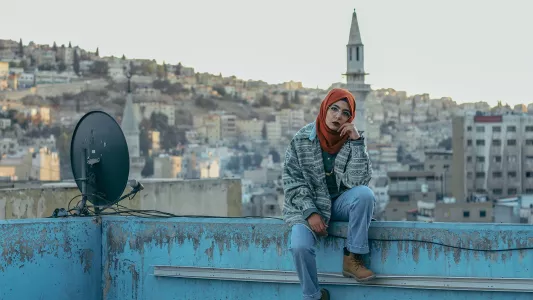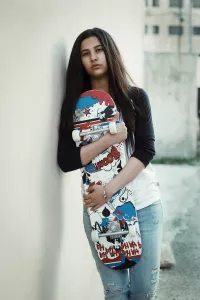The truth is that we have always had feminism too, but only under a different frame.
Lina, a 25 years old Palestinian architecture graduate, self-taught artist and poet based in Amman, the capital of Jordan, thinks that "not defining women's struggles as feminist does not mean we are not fighting against the same, or similar principles".
Jordan, a middle-eastern country with a population numbering 10 million people, has a long history of women's organizations, the first ones established between 1944 and 1945, as well as singular experiences of resistence, fight, recognition. All examples of movements or remarkable acts that we could define as feminist, if we all agree to define feminism as the willing to be treated and act equally, regardless of the gender we identify with. Yet, there exists little, and misguided, information on the matter in the country, at least with that label on. "[...] But if we look at the history we can see intersectionality between Arab societies and feminism", Lina asserts.
In 1948 the foundation of the state of Israel led to the forced migration of hundreds of thousands of Palestinians to Jordan and, as a result, the population grew by 42 percent. Those times of instability created the possibility for both Palestinian and Jordanian women to transgress dominant gender roles, be fully caught up in the general political ferment and have the chance to enter the public sphere, where historically only men could access. From the 1950s to the 1970s, 32 organizations that focused on women's affairs were established throughout the Kingdom. Among these, the Arab Women's Union was founded in 1954 by Jordan’s first female lawyer Emily Bisharat, who strongly supported women's right to vote.
In 1967 during the Six-Day war, Jordan lost control of the West Bank to Israel and another wave of Palestinian refugees reached the country. It was a further occasion for women to escape normally accepted gender behaviors and get politicized in their fights against the Israeli armies. In fact, many of them started to strongly support the Palestinian cause by offering help in social services. In that occasion, sisters like Emily and Layla Naffa established the Arab Women’s Organization in Baqa Camp and offered to help people who had just fled their home land. In 1955, in her early twenties Emily also joined the Jordanian Communist Party and took part in the demonstrations against the Baghdad Pact, disregarding her father and brother's disapproval. "In many years of oppression we have seen a lot of Palestinian women fighting and protesting side by side with men against British control of Palestine", states Lina. Laila Khaled, for example, was the first woman to hijack an airplane during the events of the so-called "Black September" in 1970-1971, the conflicts between the Jordanian Armed Forces and the Palestine Liberation Organization.
It should go without saying that all these narrated episodes in the Middle East happened on the surface of a colonizing background. Following the Syket-Picot Agreement in 1916, an outcome of an actual pencil marking on a map, France and Britain started to carve-up much of the Middle East as one of the results of the Ottoman defeat after World War One. Jordan became a protectorate of Britain in 1921 with the aim to "recognize and protect" the Middle Eastern land. Yet the European pen did not respect autocton's borders and disregarded religious, social, cultural and other particularities of the area. "The British in Jordan implemented a way of life that was foreign to the Arab world", claims Lina.
Focusing on these limited historical examples sheds light on how Jordan and its inhabitants always lived in survival mode rather than embodying a fullfilling life with the possibility of achieving personal and social goals. Consequentially, also women’s movements or revolutionary acts were more receivers of political transformations as a result of broader regional turmoils, rather than active forces of internal societal reforms.

But there is more that we can squeeze out of historical circumstances. "When a region has been colonized and externally threatened for decades, the country is filled with uncertainites", says Lina. In many scenarios of economical, political, social uncertainty like in the case of Jordan "people don't have economic empowerment, money or energy. They feel they don't have control of their life and sometimes they put it on women", perhaps so they can have a grasp on someone else's life. It is not a coincidence that, she continues, "in refugee camps the amount of domestic violence rises a lot compared to more stable circumstances." Such a historically radicated shaky scenario, then, played an important role on how women had, and still have, hard times in finding a fertile ground on which to plant seeds of recognition and equal treatment.
Digging into the historical context helps fighting the widely spread and critically accepted assumption that everything happening in the Arab world, especially regarding women, is blamed on religion. "There certainly is an orientlistic type of look that sees veiled women as oppressed", and these assertions are harmful for they take women's voices and narratives away. The artist also sees this attitude from women who define themselves as feminists and come to the region to implement "women's empowering" programs. There seems to be a process through which problems of seemingly "universal" concerns are turned into programs that many times have little to do with the context in which they are implemented. "These projects sound more like a new form of cultural colonization to me, an additional form of controlling or changing our culture, imposed on us to fight values in our religion", "[...] but the problem here is religiosity, not religion: Islam at the core doesn't endorse patriarchy", the different interpretations of the Qu'ran that have been given over time do. "Religious interpretations, and not only of Islam, are used by governements as a way to control people and perpetuate patriarchy. And patriarchy is a system of oppression that builds on other systems, such as Western imperialism." It is all interconnected.
That Islam doesn't define women as the weaker sex is not only Lina's opinion but a whole wave of women who define themselves as "Islamic feminists". Established at the end of the 20th century in the US by women originally from Asia and Africa, Islamic feminists see Islam as a religion that can in fact be empowering to women. How Islam is perceived and lived nowadays, they claim, is just a result of sexist intepretations given by men during the interpretations and transcriptions of the key texts in Islam where, in the process, women's voices were left aside. The result is how we think of Islam nowadays: a highly patriarchal religion that allows men to have total authority over women. But this is not how women lived in the pre-islamic era or, just to give an example, in the 7th century when the prophet Mohammad emigrated from Mecca to Medina to escape persecution. Many women followed his steps and moved to the new city to convert to Islam, a religion that granted equality and rights to everyone. In these times women were represented as strong individuals able to guide the faithful community, even on the battlefield. The aim of Islamic feminists is then to re-interpret and re-write religious texts for showing that an equal gender perspective is found within Islam, that you can be a Muslim and a feminist at the same time.

"Islamic feminism is one of the paths we should take, but people here don't know about it. "The feminism we hear of is Western and works over there because priorities are different. We need to create one that respects our religion, our culture, but still gives us our rights. We should never blindly adopt an ideology without examinating it first.
What the Palestinian artist suggests to embrace, is an intersectionality between women without judging an "oppressed" Muslim woman for wearing a headscarf. "Rates of domestic and sexual violence in the US are higher than here, it's not an Arab problem, it's an issue of the system which is only justified in different ways. Here it's religion, there it's something else, but the problem is global."
Jordan has a trembling political history of intersectionality. It has always been a land of regional and international passage. Thanks to this constant turmoil women could embrace the on-going political fights alongside men and with their female companions, as in the case of Palestinian women. Despite this long history of brave women's rights campaigners, however, many still refuse to call themselves feminists. They are reluctant to take up ideas immigrated from overseas which do not take into account the regional context, a bit what the British neglected during colonial times, and blame women's conditions on such an "oppressing" religion. A religion that is used as a scapegoat to neglect what is called as such in certain areas provokes similar injustices and wounds everywhere else, it is only under a different label.




